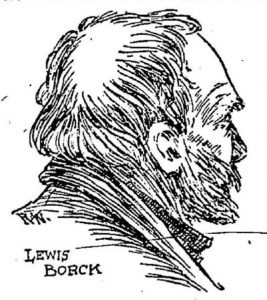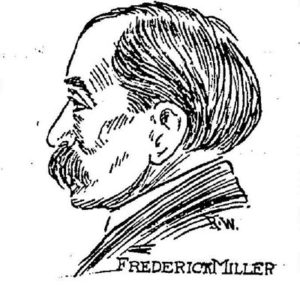Tales from Pioneers and Soldiers Memorial Cemetery
BY SUE HUNTER WEIR
160th in a Series
Louis Borck wanted only two things in life””he wanted to be left alone and he wanted to live to be 100 years old. The first, he believed, would help him reach the second. It didn”'t quite work out that way.
On February 27, 1912, Borck found himself in court trying to prove that he did not need a court-appointed guardian. He was born in Germany in 1833 so he was about 79 years old when neighbors asked officials in the welfare department to help him. That”'s when he told the judge that his only ambition was to live to see his 100th birthday. After that birthday, he said, “I do not care what they do with me.” And it was in the courtroom that he laid out his rules for a long life:
“That you live by yourself.
Eat only once or twice a day.
Always be contented.
Never worry.”
He pointed out that he owned nine head of cattle, owned a 40-acre farm, and had five dollars in cash. Neighbors claimed that Borck was unable to care for himself and that he was mistreating his cattle by feeding them only snow and a handful of hay every day. Two of the cattle had reportedly starved to death. Nonetheless, the judge denied their petition on condition that Borck “take a bath and improve his living conditions.”
Borck told a reporter that he needed to live alone because he feared “falling in with evil associates who might prevent his living a century.” He believed it even though his solitary life had not always served him well in the past.
Borck, unmarried and living alone on his farm in 1904, was the subject of rumors that he was a wealthy man who distrusted banks and had hidden a great deal of gold about his farm. On the evening of December 18, 1904, a man knocked on Borck”'s door. When he opened the door Borck was shot, struck by a bullet that merely grazed him over his right eye. He closed the door long enough to grab his own muzzle-loading shotgun, opened the door and fired at his assailant. His gun failed to go off so he returned to the house to reload but by the time he got back outside, the man was gone. Borck”'s neighbors took him in for the night. The following morning one of his neighbors walked Borck home where they ran into Fred Miller, a farmhand who Borck claimed was the man who shot him. Borck held Miller at gunpoint while his neighbor disarmed him. They then took Miller to the post office to turn him in.
Miller was indicted for first-degree assault and went on trial on January 17, 1905. Borck testified against him. A reporter described Borck as “a character in his way,” one who “speaks fair English, but is quaint in his evidence and causes many a smile to cross the faces of the people in the room.” It took the jury only seven minutes to convict Miller who was sentenced to ten years in prison.
On March 9, 1912, ten days after Borck”'s first welfare evaluation in municipal court, he was back before the judge. He had defaulted on the conditions that the judge had set for him in order to avoid having a court-appointed guardian. This time Borck lost his argument when the judge declared that Borck was unable to care for himself and appointed a guardian to manage his affairs. There is a three and a-half year gap in Borck”'s history from that point until late fall in 1915.
On November 30, 1915, Borck was committed to Rochester State Hospital where he died four months later from “exhaustion in senile dementia.” The attending physician noted Borck had suffered from dementia for several years.
Although Mr. Borck didn”'t live long enough to see his 100th birthday, he lived well beyond the 53-year-average life expectancy for American men. He died on April 18, 1916, at the age of 81.

SKETCH CREDIT: UNIDENTIFIED ARTIST OF MPLS TRIBUNE, JANUARY 20, 1905.
Louis Borck aspired to a long -100 year, simple, and worry-free life but didn”'t live long enough to see his 100th birthday, he lived well beyond the 53-year-average life expectancy for American men. He died on April 18, 1916, at the age of 81.

SKETCH CREDIT: UNIDENTIFIED ARTIST OF MPLS TRIBUNE, JANUARY 20, 1905.
Fred Miller, a farmhand who Borck claimed was the man who shot him, was indicted for first-degree assault, convicted after the jury took only seven minutes to reach that verdict, and was sentenced to ten years in prison.









